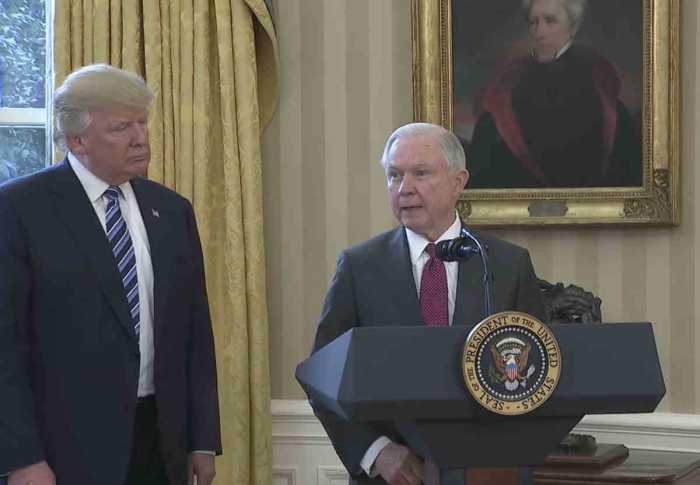Virginia high school senior Gavin Grimm. | ACLU.ORG
In sending transgender high school senior Gavin Grimm’s lawsuit seeking the right to access the boys’ bathroom in his Virginia public school back to the Fourth Circuit Court of Appeals, the US Supreme Court has chosen not to decide – in this court term – whether Title IX of the Education Amendments of 1972 and a Department of Education regulation adopted under its provisions require schools receiving federal money to allow transgender students to use facilities consistent with their gender identity.
Title IX states that federally-funded schools may not discriminate because of sex. The DOE regulation at issue allows schools to provide separate restroom and locker room facilities for boys and girls so long as they are “equal.”
The high court’s action, vacating a decision by the Fourth Circuit Court of Appeals in the Grimm case that it had earlier agreed to review, came in response to a February 22 letter from the Trump administration advising the court that the DOE and the Department of Justice had “withdrawn” two federal agency letters issued during the Obama administration interpreting the statute and the related regulation to require schools to allow transgender students access to bathrooms and locker rooms consistent with their gender identity.
The March 6 action by the Supreme Court sent the case back to the Fourth Circuit for “further consideration in light of” the Trump DOE-DOJ guidance pulling back from the Obama policy.
The case had been scheduled for argument before the Supreme Court on March 28.
Though both Grimm and his school district in Gloucester County, in the wake of the February 22 Trump administration letter, had asked the Supreme Court to go ahead and consider the underlying question of whether the 1972 law and the subsequent DOE regulation required the school to accommodate Grimm’s request, the court’s response to the Trump administration letter was not wholly unexpected.
Origins of Gavin Grimm’s Lawsuit The case dates back to 2015, when Grimm and his mother informed school administrators of his gender transition and they agreed to let him use the boys’ restrooms, which he did for several weeks with no problems.
Soon enough, however, complaints by parents led the school board to adopt a resolution requiring students to use restrooms consistent with the sex indicated on their birth certificates – so-called “biological sex” – regardless of their gender identity.
The school provided an alternative, unacceptable to Grimm, of using a single-user restroom that he found inconvenient and stigmatizing.
Grimm sued the school district, alleging a violation of his rights under both Title IX and the 14th Amendment. At the request of the American Civil Liberties Union, the Obama DOE sent a letter informing the US district court that the department interpreted Title IX and the bathroom regulation as “generally” requiring schools to let transgender students use facilities consistent with their gender identity. The Obama administration took the position that laws against sex discrimination protect people from discrimination because of their gender identity, a posture on which it was following the lead of several federal courts as well as the US Equal Employment Opportunity Commission.
The district judge, Robert Doumar, in September 2015, rejected the Obama administration’s interpretation and granted the school district’s motion to dismiss Grimm’s Title IX claim. The judge reserved judgment on his alternative claim that the school’s policy violated his right to equal protection of the law guaranteed by the 14th Amendment.
Doumar wrote that in adopting Title IX four decades ago Congress had not intended to forbid gender identity discrimination.
The ACLU appealed Doumar’s ruling to the Richmond-based Fourth Circuit, where a three-judge panel on April 19 last year voted 2-1 to reverse. The panel, relying on Supreme Court precedent, held that the district court should have deferred to the Obama administration’s interpretation of the bathroom regulation because that regulation was ambiguous on the question of transgender students accessing facilities and the administration’s interpretation was a “reasonable” one.
The dissenting judge on the appeals court panel agreed with Doumar that Title IX did not forbid the school district’s policy.
The Obama Administration’s Response Shortly after the Fourth Circuit issued its decision last spring, the DOE and DOJ jointly sent a “Dear Colleague” letter to school administrators nationwide, advising them that the government would interpret Title IX to protect transgender students and providing detailed guidance on complying with that requirement. The letter informed recipients that failure to comply might subject them to DOE investigations and loss of federal funding.
That letter stirred up a storm of protest, led by state officials in Texas, who filed a lawsuit joined by 10 other states challenging the Obama administration’s interpretation as inappropriate. A second lawsuit, filed in Nebraska by state officials there and joined by several additional states, made the same argument.
This past August, in response to the Texas lawsuit, US District Judge Reed O’Connor in Wichita Falls, Texas, granted a nationwide preliminary injunction blocking federal agencies from undertaking any new investigations or initiating any new cases involving gender identity discrimination claims under Title IX.
The Obama administration filed an appeal with the Houston-based Fifth Circuit Court of Appeals, asking that court to limit the scope of O’Connor’s injunction to cover just the states that had joined the Texas lawsuit, pending litigation on its merits.
In Virginia, meanwhile, Judge Doumar reacted quickly to the Fourth Circuit reversing his ruling, issuing a preliminary injunction on June 23 requiring the Gloucester school district to allow Grimm to use the boys’ restrooms while the case proceeded on the merits. After the Fourth Circuit panel, on July 12, denied the school district’s motion to stay Doumar’s injunction, the Supreme Court, on August 3, granted an emergency stay while the district petitioned the Supreme Court to review the Fourth Circuit’s decision.
It takes five vote to grant this type of stay, and the court typically issues no opinion explaining its action. Here, however, Justice Stephen Breyer issued a one-paragraph statement explaining he had voted for the stay as a “courtesy,” citing an earlier case in which the conservative justices had refused to extend such a courtesy in a death penalty case presenting a serious Eighth Amendment challenge. On October 28, the high court agreed to review the Fourth Circuit decision.
In its petition to the Supreme Court, the Gloucester school district asked the Supreme Court to consider three questions: whether its doctrine of deferring to agency interpretations of regulations should be abandoned; whether – assuming the doctrine was retained – it should be applied in the case of an “unpublished” letter submitted by an agency in response to a particular lawsuit; and finally whether the Obama administration’s interpretation of Title IX and the regulation was correct.
The court agreed only to address the second and third questions.
The Shift to a Trump Presidency A week later, Donald Trump was elected president. During the election campaign, he repeatedly pledged to revoke Obama administration executive orders and administrative actions, so speculation immediately focused on how the new administration’s actions would affect the Gloucester County case, especially given Republicans’ strident criticism of the Obama policy on transgender students. The appointment of Jeff Sessions, a longtime foe of LGBTQ rights, only strengthened the view the president would retreat on the bathroom access question and likely on transgender rights generally. Trump’s nomination of Betsy DeVos as secretary of education fueled even more speculation, given her family’s notorious and substantial financial support for anti-LGBTQ organizations.
Survival of the Obama administration’s Title IX guidance for very long seemed exceedingly unlikely under Trump.
The boom was lowered on February 22, though numerous press reports suggest that DeVos does not share her family’s anti-gay sentiments and opposed withdrawing the guidance. (On March 8, the education secretary met with a group of LGBTQ advocates, including the Gay, Lesbian and Straight Education Network and the National Center for Transgender Equality.) All available evidence points to Sessions as the player who insisted the Obama administration policy be withdrawn. In a White House showdown with DeVos, the attorney general won the president’s support.
The February 22 “Dear Colleagues” letter the Trump administration sent to the nation’s schools – and advised the Supreme Court about – was curiously contradictory. While announcing that the prior letters from Obama officials were “withdrawn” and their interpretation would not be followed by the federal government, the letter did not take a position directly on whether Title IX applied to gender identity discrimination claims.
Instead, the joint DOE-DOJ letter said further study was needed on the Title IX issue, while asserting that the question of bathroom access should be left to states and local school boards. Schools, the letter noted, were still obligated by Title IX not to discriminate against any students, regardless of their sexual orientation or gender identity. That point – at least suggesting that the 1972 law provided some protections based on those categories – was seemingly an attempt at a compromise between DeVos’ position against bullying and discrimination and Sessions’ opposition to a broad reading of Title IX encompassing gender identity discrimination claims. White House Press Secretary Sean Spicer said that the question of Title IX’s interpretation was still being considered by the administration.
The Supreme Court Steps Aside, For Now Since the Obama administration interpretation to which the Fourth Circuit panel had deferred was no longer operative, one of the two questions the Supreme Court had agreed to review was now moot. Even though both parties in the case urged the court to forge ahead to address the second question – the underlying issue of Title IX’s interpretation – it is not surprising that the justices decided not to do so.
The Supreme Court’s usual role is review of a lower court ruling on the merits of a case. Here, the Fourth Circuit ruling was not one on the merits as such, since its decision was based on deference to an administrative interpretation. The Fourth Circuit held that the Obama administration’s interpretation was “reasonable,” but not that it was the only correct interpretation of the regulation or the statute.
The only ruling on the merits in the case so far is Judge Doumar’s original 2015 ruling that Grimm’s complaint failed to state a valid claim under Title IX. So it was not surprising that the Supreme Court rejected the two parties’ request to decide the issue of interpreting Title IX and instead sent it back to the Fourth Circuit to reconsider in light of the Trump administration’s February 22 letter. The court usually grants review because there are conflicting rulings among the nation’s courts of appeals that need to be resolved. Here there are no such conflicting rulings under Title IX and the bathroom regulation, since the only other decisions on this question are by federal trial courts, not appeals courts.
After issuing its February 22 letter, the Justice Department abandoned the appeal filed by the Obama administration regarding the scope of Judge O’Connor’s nationwide preliminary injunction in the Texas case. Both that case and the Nebraska case will now be withdrawn as moot.
The Legal Terrain Elsewhere Even as the Grimm case moves back to the Fourth Circuit, there are several other relevant cases pending. The Cincinnati-based Sixth Circuit and the Philadelphia-based Third Circuit will be considering appeals from district court rulings on transgender student rights from Ohio and Pennsylvania, respectively; there are cases pending before trial courts elsewhere; and there are multiple lawsuits challenging North Carolina’s HB2, which among other things mandates that transgender people use public restrooms consistent with their birth certificates. One case challenging HB2 was filed by the Obama Justice Department and may be abandoned by the Trump administration.
The Fourth Circuit will shortly hear arguments on an appeal filed by three transgender plaintiffs who are students or staff members at the University of North Carolina, who won a preliminary injunction when the trial judge in their case, filed by the ACLU and Lambda Legal, deferred to the Obama administration guidance as required by the Fourth Circuit’s Grimm ruling. That judge, however, declined to rule on the plaintiffs’ claim that HB2 also violated their constitutional rights. The plaintiffs’ appeal is focused on their constitutional claim and their argument that the preliminary injunction, which was narrowly focused on the three of them, should have been broadly applied to all transgender people affected by HB2.
The case pending in the Third Circuit also focuses on a constitutional claim, as a trial judge in Pittsburgh ruled that a western Pennsylvania school district violated the 14th Amendment by adopting a resolution forbidding three transgender high school students from using restrooms consistent with their gender identity.
Whatever happens next in the Gavin Grimm case, then, the issue of transgender people and their access to public facilities consistent with their gender identity will continue to be litigated in many federal courts in the months ahead. The question may well be back to the Supreme Court soon, perhaps as early as its 2017-18 term.
By then, the court is likely to be restored to a five-member conservative majority, assuming the Senate either confirms Trump’s nomination of Judge Neil Gorsuch or, if that stalls, another conservative nominee. It is even possible that Trump may have a second vacancy to fill before this issue gets back to the high court.



































